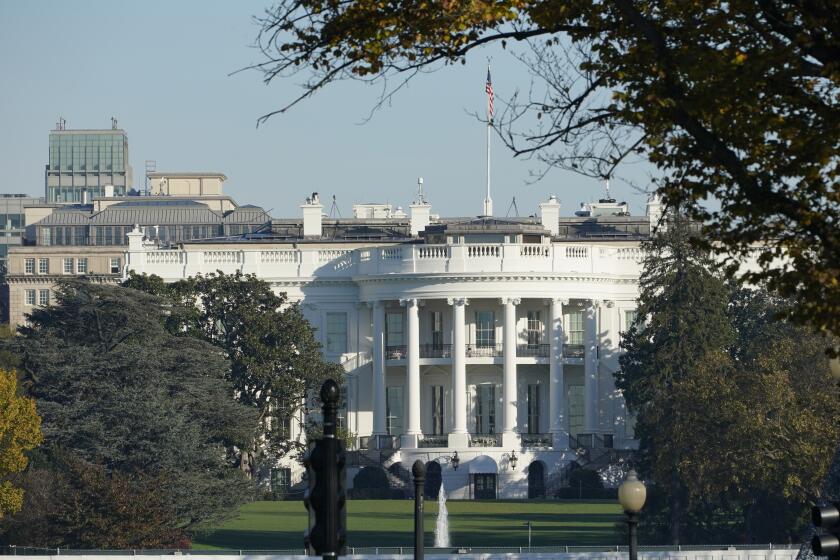‘Hoaxes and nonsense’: GOP election officials in Georgia reject Trump’s unfounded fraud claims

- Share via
ATLANTA — Georgia’s too-close-to-call presidential contest devolved into a fight Monday among Republicans as the state’s top election official rejected calls from its two U.S. senators that he resign for challenging President Trump’s unsubstantiated claims of voter fraud.
Monday morning, Gabriel Sterling, a lifelong Republican who manages Georgia’s voting system, took to a lectern at the Capitol to plainly and matter-of-factly dismiss criticism of election illegalities in the Southern battleground state as “fake news” and “disinformation.”
“Hoaxes and nonsense,” Sterling said. “Don’t buy into these things. Find trusted sources.”
Hours later, GOP Sens. David Perdue and Kelly Loeffler — who are each in a Jan. 5 run-off that will determine control of the chamber — called on Sterling’s boss, Republican Secretary of State Brad Raffensperger, to resign for allegedly mismanaging the state’s elections.
“That is not going to happen,” Raffensperger said.
Georgia’s 16 electoral votes are no longer key to deciding the election. Democrat Joe Biden has already secured 290 electoral votes — 20 more than needed to win the White House.
With Biden leading Trump in Georgia by more than 12,000 votes — 0.25% of the total — Republicans in the state are nevertheless locked in a civil war as the presidential race heads for a recount. The upheaval shows how Trump’s persistent and unfounded claims of fraud and refusal to concede the election to Biden are dividing not just the country but his own party.
The back and forth began Monday morning when the secretary of state’s office held one of its regular news conferences, with Sterling updating reporters on the status of the vote count and debunking false information.
But this time, he went to greater lengths to push back on claims of election fraud.
“The facts are the facts, regardless of outcomes,” Sterling said.
“Our job is to get it right for the voters and the people of Georgia and for the people of the United States to make sure the outcomes of these elections are correct and trustworthy,” he added. “At the end of the day — no matter which side of the aisle you’re on, no matter which candidate you supported — you can have trust and believe the outcome of these things.”
Within a few hours, Perdue and Loeffler, eager to stoke Trump supporters ahead of January’s election, called on Raffensperger to resign.
“We believe when there are failures, they need to be called out — even when it’s in your own party,” Perdue and Loeffler said in a joint statement. “The Secretary of State has failed to deliver honest and transparent elections. He has failed the people of Georgia, and he should step down immediately.”
Raffensperger, in turn, was quick to respond.
“The voters of Georgia hired me, and the voters will be the one to fire me” Raffensberger said.
“Was there illegal voting?” he added. “I am sure there was. And my office is investigating all of it. Does it rise to the numbers or margin necessary to change the outcome to where President Trump is given Georgia’s electoral votes? That is unlikely.”
Before long, Georgia Gov. Brian Kemp, a former secretary of state, entered the fray.
“Given the close outcome and the record number of mail-in and absentee ballots cast in this election, this needs to be a wake up call to the Secretary of State’s office to take a serious look at any allegations that have been made,” said Cody Hall, press secretary for Kemp. “Georgians deserve to have full confidence in the outcome of our elections.”
It could be weeks before Georgia completes its recount. A candidate can request a recount only after election results are certified. Individual counties have until Friday to certify their results and then the secretary of state must certify the statewide results by Nov. 20.
Recounts rarely change election outcomes.
In more than 5,500 statewide elections since 2000, the group FairVote reports that there were 31 recounts. Three overturned the results of an election.
There have been two statewide presidential recounts in that same period — the 2000 Florida recount in the contest between Republican George W. Bush and Democrat Al Gore and a Wisconsin recount requested by Green Party candidate Jill Stein in 2016. In both cases, very few votes shifted and the original winner remained the victor after the recount.
Over the last few days, Republicans in a number of battleground states have found themselves in the uncomfortable position of pushing back as Trump and his supporters have raised allegations of election fraud without evidence: faulty machines and middle-of-the-night ballot dumps, missing military ballots and votes coming in after legal deadlines.
After Trump and other GOP groups filed a barrage of lawsuits alleging fraud in the closely contested states of Georgia, Michigan, Nevada and Pennsylvania — most of which have been dismissed — thousands of Trump loyalists gathered at state capitols across the nation over the weekend to hold “Stop the Steal” rallies.
In Arizona, Republican Gov. Doug Ducey counseled fellow Republicans last week to not jump to conclusions until there’s a final outcome. “We’re following established Arizona election law to the letter,” Ducey said.
But perhaps nowhere has the debate been as heated as in Georgia — a state Democrats have not carried in nearly 30 years — where Republicans filed a lawsuit the day after the election to prevent the “unlawful counting of ballots received after the election” in Chatham County, which includes Savannah. The petition was dismissed the next day by a state judge who found no evidence to support the claims.
Georgia’s secretary of state’s office has in the past faced scrutiny in tight elections.
In 2018, Democrats accused Kemp, who was then secretary of state, of voter suppression in the run-up to his gubernatorial race against Democrat Stacey Abrams. After Kemp won by just 1.4 percentage points, Abrams refused to concede, accusing Kemp’s office of “gross management.”
This year is different, though, as Georgia’s Republican election officials field fierce criticism from their own party.
Over the last week, Sterling, who as a student interned on Newt Gingrich’s recount effort and went on to be state political director for George H.W. Bush and Dan Quayle, has assured Georgians of the integrity of the electoral process.
On Monday,
he said, there were no software issues with the state’s new Dominion voting system. Although there were earlier reports from Michigan, which uses the same machines, of a glitch or software problem, what actually happened there was that a clerk in a small Michigan county made a simple reporting error under trying circumstances.
Reports of thrown-out ballots in a dumpster in Spalding County, he said, were also false. After a video circulated on social media claiming to show people apparently dumpster diving for thrown-out ballots, the state sent investigators. They found no ballots, just empty security envelopes.
Reports of almost twice as many ballots cast in Gwinnett County as the overall vote were also false, he said. Under the National Voting Rights Act, the rapidly diversifying county has to use two languages — Spanish and English — and that doubles the number of pages on their ballots. The system reported ballots cast when it actually meant pages scanned.
Unwilling to concede defeat, President Trump’s team creates safe space for him while Joe Biden’s transition starts without necessary government assistance.
Although Sterling said he understood that some Republicans were upset with the outcome, he insisted nobody should be surprised that the race was tight — not after Kemp narrowly beat Abrams in 2018.
“There’s been a description that Georgia suddenly flipped from Republican for years to Democrat,” he said. “None of this is sudden. None of this is really overly surprising to the pundits to track what’s going on in Georgia. And I don’t think you can say it’s a massive flip with Biden leading by about 10,353 votes.” (The total has increased since Sterling spoke.)
Sterling said the state probably would find that some people did vote illegally or cast their vote twice.
“That will be found,” Sterling said. “Is it 10,353? Unlikely.”
More to Read
Get the L.A. Times Politics newsletter
Deeply reported insights into legislation, politics and policy from Sacramento, Washington and beyond. In your inbox three times per week.
You may occasionally receive promotional content from the Los Angeles Times.













